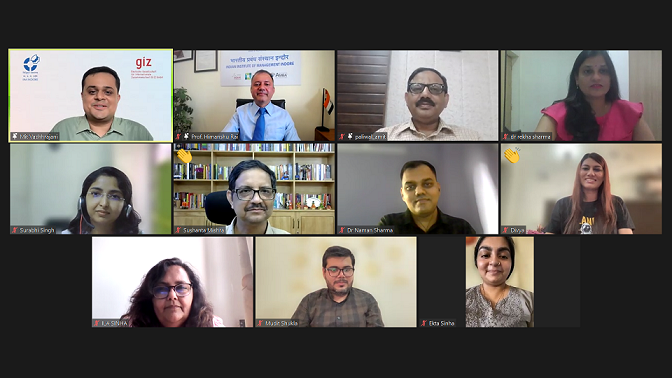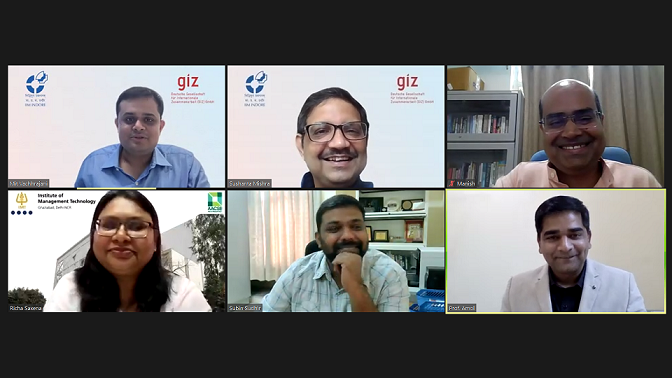The first day of the IIM Indore – GIZ Germany Online Conference concluded on a high note on April 16, 2022, with several paper presentations by authors from across the nation. The highlight of the first day was an insightful and interactive panel discussion on the topic ‘Challenges faced by educators during COVID19’. The panelists included academicians from all four directions of the nation. Prof. Subin Sudhir, Chair – Executive Education and Faculty, IIM Indore represented the central and the western region; Prof. Richa Saxena, Faculty, IMT Ghaziabad, shared her views from northern India; Prof. Manish Kumar from IIM Ranchi brought some insights from eastern India and Prof. Amol Subhash Dhaigude, Faculty, TA Pai Management Institute shared his experience representing southern India.
Sharing how IIM Indore efficiently managed its transition from offline to online classes during the pandemic, Prof. Subin Sudhir mentioned the significance of online classroom activities and upgrading the instructor’s skills. ‘Pandemic helped us understand the intensity of the digital divide while conducting online classes. However, it also allowed us to enhance our abilities and augment our teaching pedagogies, especially while considering the requirements of the students who live in remote areas, he said. We realized that technology plays a significant role in imparting education in delivery and retaining knowledge. ‘The students started reading and gaining information from the internet, not just the course material or the textbooks. He explained that this has encouraged the faculty members to be prepared, updated, and anticipate the questions during online classes. We revised our curriculum according to the needs of the students and ensured to keep the content interesting, engaging, and informative by incorporating videos and online interaction activities, he said.



Prof. Richa Saxena noted that the transition from offline to online was difficult, especially in delivery, engagement, and retention. ‘Internet connectivity, power cuts, lack of ability to see the students’ reactions, etc., were some of the challenges we faced during the lockdown. ‘Offline classrooms help a teacher interact with a student smoothly and more beneficially, for its two-way communication. On the other hand, online classes restrict you to one-way communication. She explained that you need to ensure that whatever is being taught in an online class is being grasped well by the students. However, online classes came with a silver lining of allowing us to invite speakers from across the globe who could share their experiences with our students and enhance their knowledge in various fields. This helped us enrich the curriculum and the content and expand the students’ horizons in various subjects’, she said.
Prof. Manish Kumar shared his experiences while teaching online and emphasized being open-minded during the transition. ‘Not having adequate staff on the campus, internet connectivity issues, and other technical issues were challenging. However, with time, we learned to use the software, adapt to the online classes and find solutions to the problems we as faculty and students were facing’, he said. We also decided to change our classroom rules and be liberal to encourage more interaction during online sessions. Unlike offline classes where chatting with each other wasn’t allowed, we now permitted the students to break into online rooms and have discussions and doubt clearing sessions. ‘We have also been able to conduct online placements and have recruited faculty members whom we didn’t meet for two years. However, these two years have made us adept at online teaching and augmented our teaching skills. This has been a memorable learning experience’, he said.
Prof. Amol Dhaigune mentioned that online education has increased students’ screen time and has taken a toll on everyone’s health, including faculty and administration. The students also experience isolation as they can’t interact with their batchmates. ‘I believe that the role of an institute is to support and promote online education, give adequate support and training to the faculty and staff and enhance their infrastructure,’ he said. Pandemic gave academicians a chance to overcome the fear of online teaching and find innovative ways to engage the students. ‘I ensure to incorporate an element of surprise in my lectures, and this could be a meme or a trending video that students are talking about. He said this had facilitated me in staying updated and keeping the students interested in the classes. Pandemic has also encouraged us to learn new skills. ‘Being a candidate at the FDP at IIM Indore during the pandemic has helped me learn new methods and teaching skills that proved extremely beneficial for me,’ he concluded.
The panel discussion concluded with a Q&A session. During the valedictory session, Prof. Himanshu Rai, Director, IIM Indore, announced the top three Best Paper Awards. The details are as follows:
Rank 1 (Rs. 20,000)
Being on a foreign land amid the COVID-19 pandemic: Decoding the expatriates’ experience of the pandemic and reconsidering the tenets of push-pull theory
Authors: Divya Tyagi and Mudit Shukla
Based on data collected from 31 expats from 10 countries during the COVID-19, the paper examines the challenges of expatriates. Based on the qualitative study the paper categorised the expats into homesick, settled, indifferent and conflicted expats. The study extends the literature of push-pull theory.
Rank 2 (Rs. 15,000)
Paper Title: Resource Leveraging Strategies under Uncertainty: Evidence from Indian Food Industry
Authors: Sachidananda Benegal and Kishinchand Poornima Wasdani
The paper used secondary data to understand the environmental challenges. It was followed by the interview of entrepreneurs in four ventures. The paper addressed the following questions:
How do the existing ventures orchestrate their resources during uncertain times? Could some of these ventures emerge better out from the uncertainty than others? If they do, how have they orchestrated their resources during uncertain times?
Rank 3 (Rs. 5000)
The Dynamic Role of HRM During Mandatory Work from Home – A Covid-19 Perspective
Author: Surabhi Singh
The study followed a time-lagged interviews of 30 professional service workers during the pandemic, subsequently it interviewed 10 senior HR practitioners. Based on the study the study answered an important yet neglected role of HRM in Work from Home scenario during the pandemic. It highlighted the evolving role of HR (enabler to facilitator to therapist) in helping PSWs during a crisis, specifically in WFH set up in PSFs.
Rank 3 (Rs. 5000)
Post-COVID- 19 Online Assessment Vows: An Exploration of Potential Merits, Barriers, and Solutions
Authors: Ekta Sinha and Naman Sharma
The paper presented the experiences and views of educators on e-exams. It elicits major merits, challenges, and possible solutions by deploying an exploratory grounded theory approach.
The conference concluded with a vote of thanks by Prof. Mit Vachhrajani, Conference Convenor & Faculty, IIM Indore. All the participants from across the nation appreciated the conference’s theme. It provided them an opportunity to network with the like-minded, share their views and gain knowledge during these unprecedented times.


